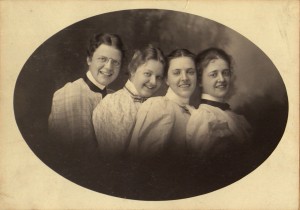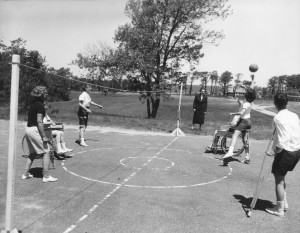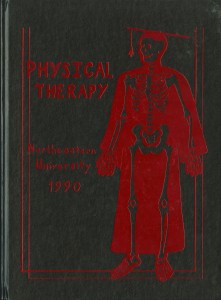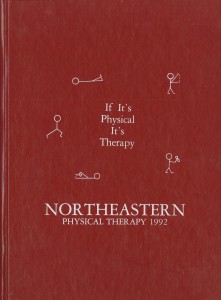Seven educated young women at the turn of the twentieth century founded a school to educate future generations of women in the principles of health and body mechanics. Known as a gymnastics school, the concept seems quaint, perhaps even antiquated, to a modern audience. While a concern for proper posture resulted from gendered and classed notions of proper behavior, initiating a capital project aimed at professional development for women transgressed these same norms. By founding the Boston School of Physical Education, these seven pioneering women not only contributed to the future of their profession in Boston but also advanced principles that would shape a new medical discipline – physical therapy. Today, their legacy lives on in the Bouvé College of Health Sciences at Northeastern University.

Four of the original seven founders of the Boston School of Physical Education. Marjorie Bouvé stands at far left.
The Department of Physical Therapy, Movement, and Rehabilitation Sciences commemorates one hundred years of leadership and innovation this November. As part of the celebrations, the Northeastern University Archives and Special Collections created an online exhibit, “A Unity of Purpose.” The line comes from the School’s original alma mater and celebrates the shared attitudes, such as service and civic engagement, which have guided students of all disciplines in their academic and professional pursuits.
Photographs, correspondence, government documents, advertisements, and even uniforms document how the Bouvé program contributed to the development of the physical therapy profession in the United States.
Through wartime service and work in polio clinics, students increased awareness within the medical field of particular rehabilitation therapies. The traditional emphases of movement and holistic bodily treatment supported arguments for greater professional autonomy throughout the later twentieth century, a period marked by increased health consciousness and rapid changes to the delivery of healthcare services.
The predecessor of current physical therapy programs at Bouvé received its accreditation from the American Physiotherapy Association in 1929. Northeastern physical therapy students thus can boast of attending one of the three oldest, continuously operating programs in the United States. This November, the Department of Physical Therapy, Movement, and Rehabilitation Sciences celebrates much more than institutional resiliency. Their centennial evokes memories of successive generations of spirited, compassionate, and forward-thinking educators and students.
To learn more about physical therapy education at Bouvé, visit “A Unity of Purpose.” You can also find a companion exhibit, “A Proud Past: Boston-Bouvé College, 1913-1977” on the Archives and Special Collections website as well as a display of historical materials on the fourth floor of the Behrakis Health Sciences Center. All exhibit materials come from collections in the University Archives.


